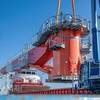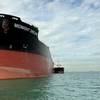ICS Meets in Oslo
The International Chamber of Shipping (ICS) held its Annual General Meeting in Oslo from June 5-7 at the Norwegian Shipowners’ Association (NSA).
National shipowners’ associations from Europe, Asia and the Americas, representing all sectors and trades and over 80% of the world merchant fleet, considered pressing international issues of concern to global shipowners and operators.
Matters discussed included the challenges associated with the implementation of new International Maritime Organization (IMO) environmental regulations and industry preparations for the entry into force of the International Labor Organization (ILO) Maritime Labor Convention.
The meeting also formally embraced the Asian Shipowners’ Forum (ASF) and the European Community Shipowners’ Associations (ECSA) as ICS Regional Partners and elected four Vice Chairmen for 2013-2015.
Impact of New Environmental Regulations
ICS members reviewed their efforts to communicate to regulators about the need for full account to be taken of the industry’s long term economic sustainability. In view of shipping’s importance to the continuing spread of global prosperity and the movement of about 90% of trade in goods, energy and raw materials, ICS members agreed that government regulators should give equal priority to each of the three pillars of sustainable development: environmental, social and economic.
“ICS members greatly welcomed the IMO Secretary-General’s personal commitment towards producing sustainable development goals for the international shipping industry and agreed that ICS will continue to participate actively in this important process,” said ICS Chairman, Masamichi Morooka.
“The vital need to protect the environment and for ships to comply fully with all new environmental regulations is fully recognised by ICS,” Mr. Morooka explained. “But as part of IMO’s new focus on sustainable development, ICS members reiterated the importance of all proposals for any future IMO environmental regulation being subjected to a full and proper cost benefit analysis, in a similar manner to proposals relating to the improvement of maritime safety.”
ICS members expressed satisfaction with the outcome of the recent IMO Marine Environment Protection Committee meeting. This included the agreement, in principle, to allow the retrofitting of new ballast water treatment equipment to be spread over a five year period, rather than two or three years as the Ballast Water Management (BWM) Convention currently requires, and to treat ships constructed before the Convention enters into force as ‘existing ships’.
Mr. Morooka said, “If this commitment to amend the BWM Convention as soon as it enters into force is confirmed as we hope by the IMO Assembly in November, this will remove a great deal of the uncertainty that has been hanging over the industry for many years. We are very pleased that governments have broadly listened to ICS as we have explained our concerns about these complex implementation challenges.”
With respect to the imminent switch to distillate fuel that will be required to comply with new IMO sulphur regulations, beginning with the 0.1% sulphur in fuel requirements in Emission Control Areas (ECAs) from 2015, ICS members continued to express concern about fuel availability. The ICS AGM therefore reaffirmed its long standing call on governments to advance the timing of the fuel availability study that IMO must complete under the terms of the MARPOL Convention.
“We will continue to press governments on this issue to raise much needed awareness of the wider implications of the introduction of the global sulphur cap as well as the impact of the ECA requirements," Mr. Morooka said. “The massive increase in demand for distillate fuel for ships is also likely to have economic and practical impacts on shore based transport and industry. With respect to the ECAs, the potential for modal shift away from efficient maritime transport services may also have a negative net effect on the environment. We think it most important that the impacts of these major changes are fully understood by governments as they implement the MARPOL requirements.”
With respect to discussions at IMO about the establishment of a mandatory system of Monitoring, Reporting and Verification of CO2 emissions (MRV), Mr. Morooka remarked, “ICS will fully support the concept of MRV, provided that any measure adopted is developed and agreed at IMO, and that it will be simple to administer and based primarily on fuel consumption measured by bunker delivery notes.”
However, the AGM reaffirmed that ICS support for the development of an MRV mechanism does not imply acceptance of MRV itself being used for the eventual development of any other Market Based Measure, or the mandatory application of energy indexing measures to existing ships.”
ILO Maritime Labor Convention
ICS members welcomed the entry into force of the ILO Maritime Labor Convention (MLC) in August this year, but stressed the importance of shipping companies being ready to demonstrate compliance. However, there is concern that smooth implementation of the MLC may be hampered by the large number of nations that have still yet to ratify the Convention, as well as the lack of guidance from some flag states on detailed national provisions as the MLC requires.
“We agreed that it is vital that shipping companies prepare a Declaration of Maritime Labor Compliance, Part II, for each of their ships as soon as possible. ICS welcomes the recent agreement by the Paris MOU on Port State Control that full PSC enforcement should not begin until August 2014, in line with a Resolution passed by the ILO in 2006,” the ICS Chairman said. “But some national authorities may still decide to take a different approach towards PSC enforcement. It is therefore most important that companies are as prepared as they can be by August if they want to avoid possible problems.”
ICS agreed to issue further guidance to its members on preparations for PSC enforcement very shortly, in addition to that already contained in its widely used ISF Guidelines on the Application of the ILO MLC.
The ICS AGM also noted the importance of ships being able to demonstrate full compliance with IMO/ILO work hour regulations, including the maintenance of individual records, since this requirement would be enforced, in line with the STCW Convention, regardless of the approach taken towards immediate PSC enforcement of the ILO MLC.
“ICS members were directly responsible for the negotiation of the MLC in 2006 and we therefore have a special interest in helping to ensure that implementation is as smooth as possible,” Mr. Morooka said.
Regional Partners
The ICS AGM agreed to embrace the Asian Shipowners’ Forum (ASF) and the European Community Shipowners’ Associations (ECSA) as ICS Regional Partners.
“Relations with ASF and ECSA have always been highly productive and cordial given our common membership of national shipowners’ associations. However, by referring to ASF and ECSA as our Regional Partners, the nature of our very close relationship will hopefully be better understood by governments and by the industry at large,” Mr. Morooka said.
Elections
The ICS AGM elected four Vice Chairmen for 2013-2015: Mr. John C Lyras (Greece), Mrs. Karin Orsel (Netherlands), Gerardo Borromeo (Philippines) and Mr. Esben Poulsson (Singapore).
Mr. Morooka (Japan) continues to serve as ICS Chairman having been elected for a two-year term in 2012.












